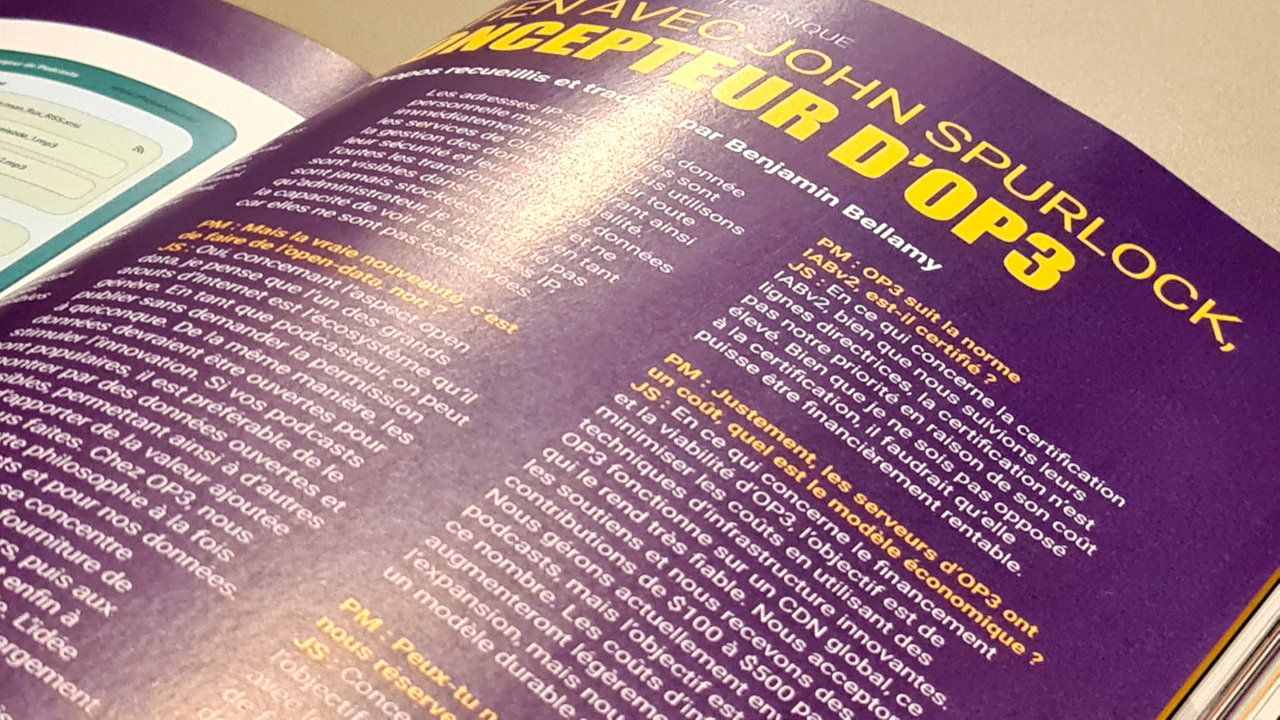
Understanding OP3 with John Spurlock
OP3 (Open Podcast Prefix Project) is a response to the need for a reusable podcast infrastructure that safeguards listener data, offering open, accessible statistics for the podcast industry, emphasizing transparency and the potential for innovation through open data practices.
This interview was originally written in French for issue 3 of “Le Podcast Magazine” (1st magazine dedicated to the Podcast in France).
Benjamin Bellamy: Hello John, can you tell us what drove you to create OP3?
John Spurlock: This followed discussions I had during Podcast Movement. It came shortly after Spotify's acquisition of Chartable and Podsights. My idea was to change from the traditional model. With the tools available today, I think it's easier to create a reusable infrastructure for podcasts, and this prevents the misuse of listener data by private companies. Podcasters are just looking to get reliable statistics on their audiences. With OP3 (Open Podcast Prefix Project), I envisioned a simple solution, offering public pages and information accessible to everyone in the podcast industry. OP3 is public, which is crucial as podcasting is known for its transparency. Unlike closed music platforms, we lack information on the popularity and trends of podcasts in different regions. OP3 aims to fill this gap by offering transparency comparable to platforms like YouTube.

BB: How does it work?
JS: In terms of analytical standards, OP3 follows the IABv2 specification, but with a more rigorous approach to classifying bots and processing IP addresses. We use an open list for user agents (listening software), updated in collaboration with the “Open Podcast Analytics Working Group” to ensure uniformity and reliability in our analyses. Furthermore, what we do with OP3 can be easily replicated by others, as we have published the project as open source. This means that everyone can view our code and understand our decisions. This is a unique approach in the industry and aims to build trust.
BB: You collect data, is it sensitive?
JS: In terms of compliance, especially with GDPR, we have a minimal approach to data collection. IP addresses are the only personal data handled, and they are immediately hashed. We use Cloudflare's services for all data management, thus ensuring their security and confidentiality. All data transformations are visible in our code and are never stored. In fact, as an administrator, I don't even have the ability to see IP addresses, as they are not retained.

BB: But the real novelty is making open data, right?
JS: Yes, regarding the open data aspect, I think one of the great assets of the Internet is the ecosystem it generates. As a podcaster, you can publish without asking anyone's permission. Similarly, data should be open to stimulate innovation. If your podcasts are popular, it's better to demonstrate this with open and accessible data, allowing other players to add value to what you do. At OP3, we apply this philosophy to both our podcasts and our data. Currently, OP3 focuses mainly on providing data to podcasters, then to podcast applications, and finally to the industry as a whole. The idea is not to allow the download of a complete database like PodcastIndex.org does, but to provide specific statistics and analyses. Users can get data on specific podcasts if they know their URLs. We may consider making the data more widely available on a paid basis in the future to support the project.

BB: But are the data of a podcast free?
JS: OP3 is free for podcasters and offers total transparency. The statistics of a podcast cannot be private; they are public by default. For a podcast's data to be available on OP3, it must also be listed in PodcastIndex.org.
BB: OP3 follows the IABv2 standard, is it certified?
JS: Regarding IABv2 certification, although we follow their guidelines, certification is not our priority due to its high cost. While I'm not opposed to certification, it would need to be financially viable.
BB: Indeed, the OP3 servers have a cost, what is the business model?
JS: Concerning the funding and viability of OP3, the goal is to minimize costs using innovative infrastructure techniques. OP3 operates on a global CDN, making it very reliable. We accept support and receive contributions of $100 to $500 per month. We currently manage about a thousand podcasts, but the goal is to increase this number. Infrastructure costs will increase slightly with expansion, but we hope to maintain a sustainable model through sponsorship.

BB: Can you tell us what OP3 has in store for the future?
JS: Regarding the development of OP3, the goal is to improve integrations with podcast hosts and to make our service known to more podcasters. We are also looking to improve integrations with third-party systems for better data management.
BB: Thank you, John, for all these answers! A word to conclude?
JS: I think that the reliability of data in the podcast industry is a crucial issue. I am convinced that the transparency and openness of OP3 contribute to a better understanding and improvement of the entire sector.

Illustrations by Katerina Limpitsouni


 🇫🇷 Vous pourrez retrouver cet article en Français dans le numéro 3 de
🇫🇷 Vous pourrez retrouver cet article en Français dans le numéro 3 de 


